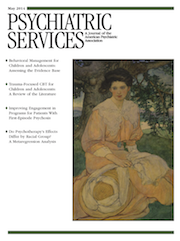This Month’s Highlights
High Evidence for Two Interventions
Two literature reviews this month analyze research findings on evidence-based interventions for children and adolescents. The first review looked at behavioral management, which is designed to help a child or adolescent develop or maintain prosocial behaviors, such as demonstrating positive, nonaggressive relationships with others and complying with rules and authority figures. Melissa H. Johnson, M.A., M.P.H., and colleagues rated the level of evidence for behavioral management as high because of the number of well-designed randomized controlled trials (RCTs) across settings, particularly for family-centered interventions and those that integrate family- and school-based approaches. However, more research on the long-term impacts of this intervention is needed (page Original article: 580). The second review examined and rated the evidence for Trauma-Focused Cognitive-Behavioral Therapy (TF-CBT), a manualized parent-child treatment that uses cognitive-behavioral principles and exposure techniques to prevent and treat posttraumatic stress, depression, and behavioral problems. Michael A. Ramirez de Arellano, Ph.D., and colleagues rated the evidence as high on the basis of ten RCTs. TF-CBT has demonstrated positive outcomes in reducing symptoms of posttraumatic stress disorder, although it is less clear whether it is as effective in lessening behavior problems or symptoms of depression (page Original article: 591). The two reviews are part of the SAMHSA-funded Assessing the Evidence Base Series, which provides updates of research on 13 commonly used interventions for people with serious mental illness.
Better Engagement in FEP Services
First-episode psychosis (FEP) services have been implemented internationally in response to evidence that effective intervention during the early stages of a first psychotic episode may have a significant impact on the course and outcome of the illness. However, like any intervention, FEP services are effective only to the extent that patients are willing to engage with them. In a review of research on FEP services, Roisin Doyle, B.A., M.Sc., and colleagues identified demographic and clinical predictors of disengagement. Variables that exerted a consistent influence on disengagement across studies were duration of untreated psychosis, symptom severity at baseline, illness insight, substance abuse, and involvement of a family member—although findings were conflicting as to the direction of influence of some factors (page Original article: 603).
Psychotherapy for Depression: No Difference in Outcomes by Race-Ethnicity
Several psychotherapies are effective for treating depression among adults. However, few studies have directly examined the effectiveness of these treatments for adults from racial-ethnic minority groups. To overcome this limitation, Burçin Ünlü Ince, M.Sc., and colleagues, pooled data from 56 RCTs of psychotherapy for adult depression in which the racial-ethnic backgrounds of participants were reported. Their metaregression analysis found an overall moderate effect size in favor of psychotherapy. No significant moderating effect of race-ethnicity was noted in either bivariate or multivariate analyses. Because their meta-analysis did not find evidence of racial-ethnic differences in effectiveness, they call for more attention to “the gap between effective mental health care and the delivery of these services” (page Original article: 612).
Two Studies Report Disparities
Two studies based on large data sets report disparities in treatment in France and the United States. In a cohort of more than 14,500 residents of Marseille, Aurélie Bocquier, M.S., and colleagues tested the inverse-care law, whereby the availability of good medical care varies inversely with the need for it. They examined early discontinuation rates of antidepressants among individuals with low-income health coverage and those with other coverage. Overall, nearly 72% of the cohort discontinued treatment early. The authors found some social inequalities, with low-income patients and women significantly more likely to stop taking their medications (page Original article: 618). The U.S. study examined 2001–2005 epidemiologic data to assess racial-ethnic differences in access to high-quality treatment for at-risk drinking and for alcohol abuse. Compared with whites, members of racial-ethnic minority groups had less than two-thirds the odds of receiving an alcohol intervention over the study period. When authors Nina Mulia, Dr.P.H., and colleagues simulated strategies to narrow the gap, they found that the disparities could be mitigated by providing services in alternative delivery sites, including faith-based and social services institutions. Broader access may be of greatest help to Hispanics, who experience the most acute gaps in service use, the authors said (page Original article: 626).



